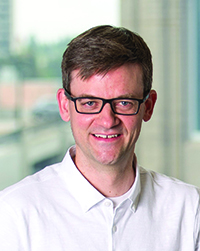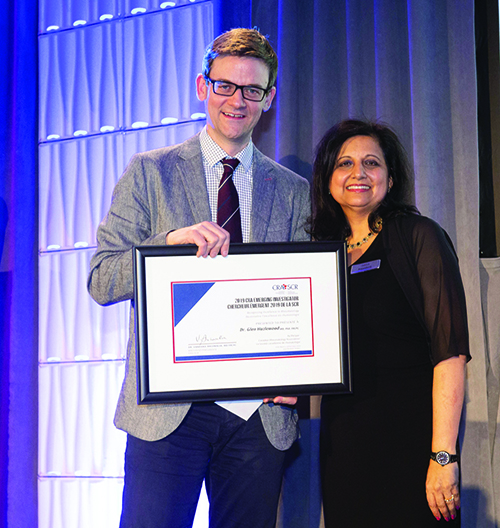Summer 2019 (Volume 29, Number 2)
Emerging Investigator:
Dr. Glen Hazlewood
Download PDF

What inspired you to focus your
research on drug effectiveness
and patient treatment preferences?
First, it was great mentors! My research
interest started through
my involvement in the CRA Rheumatoid
Arthritis (RA) Guidelines.
I started this as a fellow, and became
interested in how treatment
decisions are made, both within
guidelines and with individual
patients. It also opened my eyes
to how much we still don’t know
about the decisions we make every
day.
Recently, you have been awarded
a four-year grant to conduct
a multi-centre randomized controlled trial of drug reduction
in patients with RA in sustained clinical remission.
What are your hopes or expectations regarding
the outcome of this study?
Our hope is that, through this trial, we can show it is possible
to safely reduce medication in many patients who are
doing well (in remission). Importantly, we are designing our
trial to be as "pragmatic" as possible, meaning that it reflects
how tapering would typically occur in actual practice.
Our hope is that the results will help patients and rheumatologists
decide whether tapering (reducing treatment) is
appropriate or not once patients have achieved sustained
remission.
How do you manage teaching students as an assistant
professor on top of running your research programs?
If things work well, it actually makes everything easier! Not
to mention, it ensures you stay up to date.
You have established a collaboration between several
international groups, including Cochrane and the
American College of Rheumatology, to conduct collaborative
"living" evidence reviews. What type of emerging
results have you noticed and how will this impact
the RA treatment landscape?
A major challenge with guideline
development is staying on top of
rapidly changing evidence. There
is also a lot of duplication of effort.
Our hope with this project is that
guideline groups can collaborate
on the evidence-review aspect of
guideline development and maintain
this effort over time. An early
lesson I’ve taken from this work is
that effective collaboration benefits
everyone.
You already have many long-term
research projects running
at once, but what other future directions
would you like to focus
on? What are your hopes for the
general direction of development in the field of rheumatology?
Treatment choices are becoming more complex. We have
more treatments, and will see more evidence to inform
treatment selection, including typical evidence (randomized
and non-randomized studies) and newer precision
diagnostics. A major challenge will be how to integrate
this evidence to inform patient-centred treatment decision-
making. My hope is that we can solve these challenges
by considering the entire decision process when prioritizing
and designing research studies.
What are some of the highlights and challenges you
have experienced thus far in your career? How have you
overcome these challenges?
The nice (and hard) part of academic medicine is that you
get constant little rewards (and disappointments). Balancing
clinical, academic and family life is also challenging –
but also keeps me grounded. My kids couldn’t care less if
my paper is rejected!
What was your first thought when you learned you
would receive this award?
Thrilled!
For those wanting to pursue rheumatology and a career
in research, what advice would you give them?
Try it, even if you’re unsure. I never had thought about
rheumatology until I tried it right before the Canadian Resident
Matching Service (CaRMS) match, and hadn’t really
thought about research until I tried it in my fellowship.
Your success in obtaining research funding is commendable,
with over one million dollars as a principal
investigator. Any tips you can offer on the subject of
making a solid grant proposal?
Keep it simple, add something a bit novel, and don’t oversell
what you are doing. Get someone who can be objective
to read/critique your grant and keep trying because there’s
a lot of luck involved.
If you weren’t pursuing research as a career, what would
you be doing?
Clinical rheumatology – which I still really enjoy! Probably
more vacations as well. Wait a second, that sounds quite
nice…
Are you more of a morning or night person?
Morning – although it depends on the day!
How many cups of coffee does it take to make a productive
day?
At least three.
If you could eat one food for the rest of your life, what
would it be?
Sushi.

Dr. Glen Hazlewood receiving his award from Dr. Vandana Ahluwalia.
Glen Hazlewood, MD, FRCPC
Assistant Professor,
Departments of Medicine and Community Health Sciences,
Cumming School of Medicine,
University of Calgary,
Calgary, Alberta
|
